Share
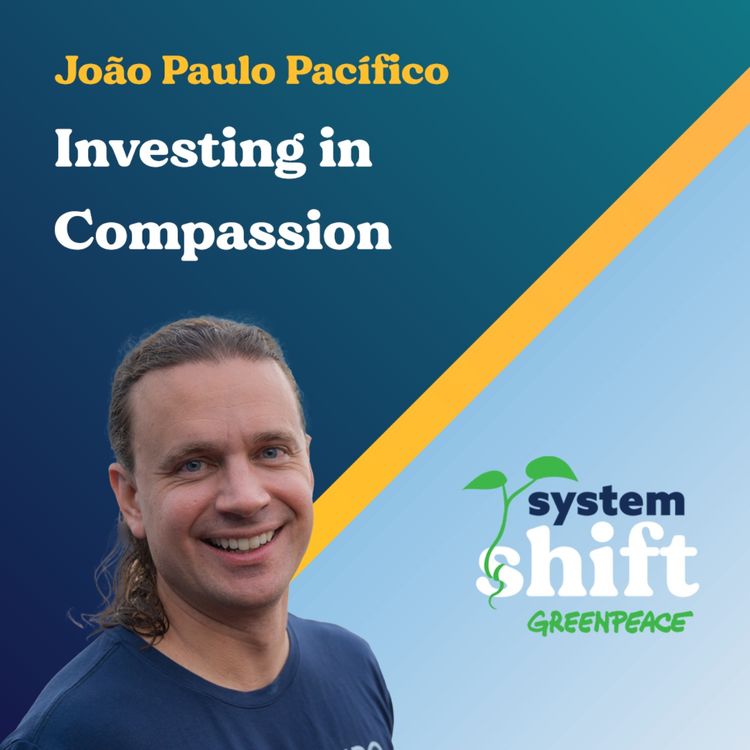
SystemShift
João Paulo Pacífico: Investing in Compassion
Millionaire businessman, João Paulo Pacifico, challenges the very foundations of conventional economic wisdom in this captivating episode. Unveiling the hidden facets of financial markets, João Paulo shares firsthand experiences from the tumultuous 2008 crisis, highlighting the dehumanisation within the system. He recounts a pivotal moment during the crisis, leading him to question the ethics of capitalism, and create Gaia, a venture founded on principles of empathy and sustainability, aiming to redefine success in the business landscape. The conversation explores the origins of innovation, debunking the myth of individual genius and shedding light on the collaborative efforts behind groundbreaking advancements. From critiquing exploitative financial practices to advocating for impact investing, this episode examines the urgent need for alternative business models that prioritise both people and the planet.
SystemShift comes from Greenpeace Nordic and is hosted by Greenpeace Sweden campaigner, Carl Schlyter, and produced by Alexia Fridén, with additional support from Zane Ford, Christian Aslund and Attila Kulcsár.
More episodes
View all episodes

9. Helena Norberg-Hodge: Local Solutions for a Connected World
01:04:03||Season 2, Ep. 9For the last episode of SystemShift season 2, we are joined by Helena Norberg-Hodge, pioneer of the new economy movement, who delves into the far-reaching consequences of the prevailing economic model on local economies and ecosystems. Through her experiences in Ladakh, she describes the erosion of traditional values and community cohesion in the face of modernisation and consumerism. Helena advocates for a movement towards localisation, stressing the importance of decentralised, community-driven initiatives for environmental sustainability and overall wellbeing. From critiquing economic theories rooted in colonisation to proposing actionable solutions for a more interconnected, relationship-based economy, Helena explores the complexities and drawbacks of the modern economic model and the imperative for systemic transformation.SystemShift comes from Greenpeace Nordic and is hosted by Greenpeace Sweden campaigner, Carl Schlyter, and produced by Alexia Fridén, with additional support from Zane Ford, Christian Aslund and Attila Kulcsár.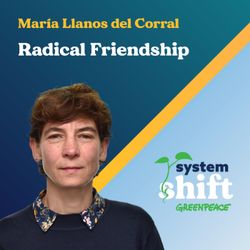
8. María Llanos del Corral: Radical Friendship
56:35||Season 2, Ep. 8María Llanos del Corral, a pioneer in community-driven development and the visionary behind the Eroles and La Bolina projects, shares her wealth of experience in fostering cooperative power through grassroots organising and groundbreaking project implementation. Listeners will discover the profound impact of radical friendship as a cornerstone of trust-building within projects aimed at social regeneration and repopulation. María delves into the imperative of challenging market-driven paradigms that dehumanise individuals, particularly migrants. Discover how La Bolina's initiatives are reshaping societal norms, challenging traditional power structures, and inspiring positive change in rural areas. Gain practical wisdom on overcoming fear, nurturing inclusive collaboration, and reclaiming ambition in the pursuit of a more equitable and sustainable future.SystemShift comes from Greenpeace Nordic and is hosted by Greenpeace Sweden campaigner, Carl Schlyter, and produced by Alexia Fridén, with additional support from Zane Ford, Christian Aslund and Attila Kulcsár.
6. Ashish Kothari: Touched by Nature
01:12:21||Season 2, Ep. 6Ashish Kothari draws on his experience in the areas of wildlife and biodiversity to explore the profound consequences of human disconnection from nature. From bonding with a baby monkey in Kerala to discussing the impact of farmer protests in North India, we navigate through the interconnected realms of psychology, economics, and ecology. The conversation delves into personal anecdotes, societal implications, and potential alternatives to our modern, urbanised lifestyles and looks at various transformations taking place on the ground. Learn about the "flower of transformation" and how its five petals – politics, economics, society, culture and knowledge, and environment and ecology – intertwine to shape a holistic perspective for a better world. Ashish goes into detail with an inspiring example of 5,000 marginalised Dalit women farmers in India who successfully transitioned to sustainable, collective farming practices and movements advocating for food sovereignty, such as the recent farmer protests in North India against laws promoting commercialisation. SystemShift comes from Greenpeace Nordic and is hosted by Greenpeace Sweden campaigner, Carl Schlyter, and produced by Alexia Fridén, with additional support from Zane Ford, Christian Aslund and Attila Kulcsár.
5. Peter Victor: Sustainable Horizons
01:02:21||Season 2, Ep. 5Peter Victor, Professor Emeritus and Senior Scholar at York University, Canada and author of Escape from Overshoot. Economics for a Planet in Peril (2023), looks at the intersection of ecology, economics, and sustainable living, diving deep into the historical roots of our current environmental dilemmas. Peter explores the impacts of economic growth and the concept of overshoot, delving into the complexities of 'green growth,' and grappling with the hurdles of achieving net-zero emissions on a global scale. Peter takes us through concepts aimed at a fair distribution of wellbeing resources such as 'contraction and convergence’, 'circular economy’ and ‘steady-state economy’. The episode takes a positive turn when Victor shares his vision for a wellbeing-focused political landscape, concluding with optimism about achieving balance in economic theories to avoid overshoot. SystemShift comes from Greenpeace Nordic and is hosted by Greenpeace Sweden campaigner, Carl Schlyter, and produced by Alexia Fridén, with additional support from Zane Ford, Christian Aslund and Attila Kulcsár.
4. Tove Maria Ryding: Untangling the Global Tax Web
54:26||Season 2, Ep. 4In this episode of the SystemShift podcast, Tove Maria Ryding from the European Network on Debt and Development (Eurodad) joins us for a thought-provoking discussion on the crucial need for a UN tax convention. Delving into the intersection of tax and environmental issues, Tove looks at the principles that should guide the establishment of a fair global tax system. She emphasises the importance of preventing countries from becoming tax havens, ensuring accountability in tax spending, and simplifying the complex network of international tax treaties. The episode explores the impact on small and medium enterprises, the ongoing UN negotiations for a tax convention, and the potential contributions of tax reforms to a wellbeing economy. Listeners are encouraged to take action and demand accountability from their politicians, shedding light on the groundbreaking developments in the push for a fair and effective global tax system. Tune in to gain insights into the complexities of the current tax landscape and discover how individuals can play a role in shaping a more equitable future.SystemShift comes from Greenpeace Nordic and is hosted by Greenpeace Sweden campaigner, Carl Schlyter, and produced by Alexia Fridén, with additional support from Zane Ford, Christian Aslund and Attila Kulcsár.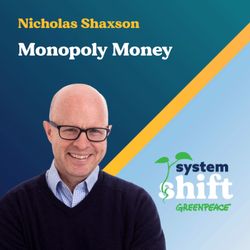
3. Nicholas Shaxson: Monopoly Money
56:09||Season 2, Ep. 3Nicholas Shaxson, author and expert on the global economic system, looks at the intricate web of global finance, exploring the unseen forces shaping our economies and societies and exposing the hidden impacts of tax deregulation and monopolistic market practices. From the United Kingdom's economic struggles to the pervasiveness of big tech firms, this episode unveils the hidden mechanisms of monopolistic power, particularly in the energy and financial sectors, and shows how their immense power affects everything from income inequality to climate action. Nicholas sheds light on the profound effects on workers, consumers, and democracy, and the emerging global movement challenging these monopolies as well as the detrimental effects these have on societal wellbeing and long-term growth. As we navigate a world shaped by recent economic shifts, Nicholas explores the complexities of regulatory challenges, offering a pathway towards a more equitable, inclusive, and sustainable economy. Join us in uncovering the intricacies of monopolistic power and learn how addressing these economic forces can pave the way for a wellbeing economy that caters to the needs of society and the planet.SystemShift comes from Greenpeace Nordic and is hosted by Greenpeace Sweden campaigner, Carl Schlyter, and produced by Alexia Fridén, with additional support from Zane Ford, Christian Aslund and Attila Kulcsár.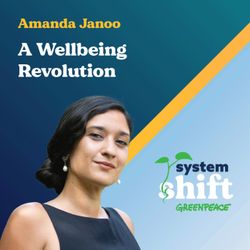
2. Amanda Janoo: A Wellbeing Revolution
53:46||Season 2, Ep. 2Amanda Janoo, Economics and Policy Lead at the Wellbeing Economy Alliance, looks at how we can reshape economic models to align with both ecological preservation and human flourishing. Amanda takes us on a journey through the wellbeing economy movement, scrutinising how the conventional emphasis on growth and wealth maximisation has exacerbated crises like climate change, inequality, and mental health issues. She dissects the impact of the current failing economic and financial systems on the environment and human lives, highlighting the urgent need for a paradigm shift towards a wellbeing-oriented economy. Drawing parallels between Wales and Canada's alternative national performance frameworks to GDP, Amanda underscores the need to integrate social and ecological wellbeing into decision-making processes. She champions participatory democracy, citing Spain's citizens' assembly on climate as an empowering example.SystemShift comes from Greenpeace Nordic and is hosted by Greenpeace Sweden campaigner, Carl Schlyter, and produced by Alexia Fridén, with additional support from Zane Ford, Christian Aslund and Attila Kulcsár.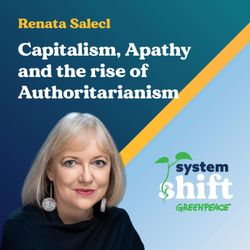
1. Renata Salecl: Capitalism, Apathy and the Rise of Authoritarianism
50:40||Season 2, Ep. 1Slovenian philosopher, sociologist and legal theorist, Renata Salecl, lays bare the fraying fabric of our communities, worn thin by corruption and apathy and she examines corporate exploitation, the unchecked dominance of technology behemoths, and the unsettling rise of new authoritarianism. Renata explores societal inertia, uncovering how feelings of helplessness and disenchantment often render individuals passive and how authoritarian forces capitalise on societal disconnection. She explains that the extreme individualism promoted by capitalism is exactly what needs to be overcome in order to tackle existential crises such as climate change. She confronts the stark realities of corruption, injustice, and the mental health toll perpetuated by capitalist structures—a relentless pursuit of productivity that often culminates in guilt, anxiety, and a dearth of empathy amidst cutthroat competition.The SystemShift podcast returns for a second season where we look beyond the problems of our economic system and take you on a quest to piece together what a wellbeing economy could look like and how we can get there. As millions of ordinary people feel besieged by a multiplicity of crises, we delve into the shadows to reveal the myths and disinformation that shroud our understanding of the current failing economic and financial systems that drive the exploitation of people and the planet.SystemShift comes from Greenpeace Nordic and is hosted by Greenpeace Sweden campaigner, Carl Schlyter, and produced by Alexia Fridén, with additional support from Zane Ford, Christian Aslund and Attila Kulcsár.